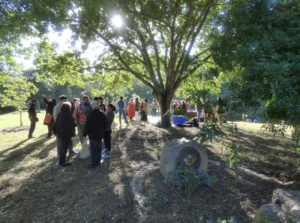The Benarrawa Community Development Association has cultivated a long, continuous and rich relationship with local First Nations Peoples for over 30 years. The centre officially emerged in 1995 from relationships built via local reconciliation learning circles and the subsequent establishment of the Benarrawa Aboriginal and Torres Strait Islander Solidarity Group (BenATSI). Today this connection is still flourishing and is evident in the array of community led events and annual ceremonies hosted by Benarrawa.
Paula Callaghan job-shares the Community Development Coordinator position at Benarrawa with John Maume and they work alongside project worker, Sandiellen Black to form the Community Development team who are deeply passionate about the centre’s grassroots history. Paula highlights how the centre’s beginnings continue to influence current practices and how the relationships forged with the Solidarity Group in the early 1990s still holds strong today.
“There are members of the solidarity group that have been there from the beginning, it’s the grassroots of the organisation, it influences so much in the way we work. One of the founding members has just turned 97 and still comes to events today.”
Paula expresses how these ongoing relationships have allowed Benarrawa to hold community events which are organised alongside First Nations Elders and Cultural Workers. Each year, Benarrawa hosts an annual Survival Day Ceremony and Sorry Day Ceremony. For over a decade, their centre also hosted the Aboriginal and Torres Strait Islander Art Show and Cultural festivals in partnership with Milpera SHS. Benarrawa has regular educational events for community members and teachers, including Community Conversations, Elders lunches and the Educators Learning Circle.
“The Educators Learning Circle started bubbling up as our contact with schools, kindies and childcare centres brought in more people wanting to educate themselves about First Nations Peoples and the true history of the local area. The learning circle happens once a term and brings together Aboriginal and Torres Strait Islander Elders, cultural workers, community members and teachers with other educators in the community for reciprocal learning and sharing” explains Paula.
Each Circle hosts a guest speaker (often someone with a First Nation’s background) who has experience as an educator. They share resources, experiences and cultural protocols with the goal of learning and building strong reciprocal relationships.
“Our focus is to bring people together, to have conversations that are sometimes difficult, to listen to people’s views and experiences that we otherwise might not have access to.”
In the early 2000s, Benarrawa developed a local Aboriginal history booklet and hosts culture walks, which is an opportunity for community members, schools and faith-based organisations to explore the local area and learn about the significant cultural sites and histories in their own backyard.
Among the many events occurring at Benarrawa, Paula highlights their annual Survival Day Ceremony as one that is particularly poignant for her.
“It’s a special ceremony… simple, very family friendly and at the end we [the attendees] are given the opportunity to walk down to the pontoon and cast flowers into the Oxley Creek, to remember and pay homage to the First Peoples and how they cared for the lands and waterways for thousands of years prior to colonisation… its significant as it enables us to take some time to respectfully reflect on what the day means for our First Peoples and their communities.”
Interest in the Survival Day Ceremony has grown over time, attracting over 300 attendees prior to the pandemic.
“The shift in the public’s focus of what January 26th means and to see people actively seeking alternatives to acknowledge the First Peoples ongoing survival, and the importance of truth-telling is amazing. Witnessing so many people coming out in the early morning with their families, children, neighbours and even dogs, talking openly, sharing breakfast; and the local school’s engagement with students taking an active part in the ceremony, making it a priority, is incredible.”
The relational and community development philosophies that underpin the work of Benarrawa have created a special place that benefits community and staff alike. Paula expressed how significant relationships built at Benarrawa over the years motivate and inspire her work every day.
“Benarrawa has a 30 year plus history, and I feel deeply privileged as a worker coming into this and building upon the reciprocal relationships of respect and trust… these values that we hold dearly at Benarrawa and the community development approach has helped me both personally and professionally. I’ve learned so much and continue to do so each day.”
If you’re interested in learning more about the work at Benarrawa, attending a learning circle, culture walk or ceremony you can reach out on their website: https://www.benarrawa.org.au
Written By: Taylor Bast
Published: November 2022
